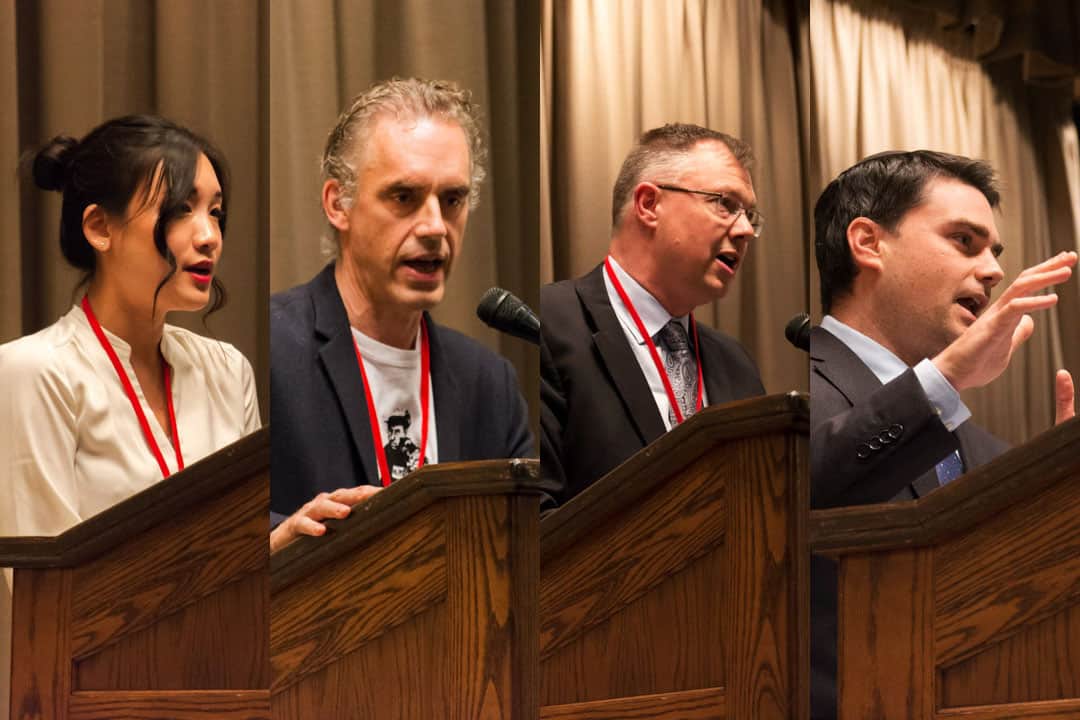On June 28, chapters of Students in Support of Free Speech (SSFS) from U of T and York University hosted the Canadian Freedom Summit at Chestnut Conference Centre. The event featured U of T psychology professor Dr. Jordan Peterson, Editor-in-Chief of The Daily Wire Ben Shapiro, and President of the Justice Centre for Constitutional Freedoms (JCCF) John Carpay.
There was also a “Campus Censorship Panel” that consisted of Amanda Ellen Gibbs, Josephine Mathias, and Alexander Van Hamme. The three spoke on “the impact of censorship on campuses, and how it affects… intellectual and academic liberties.”
The event was high-profile: it was chronicled by a number of videographers and photographers, and it sold out of tickets that ranged between $20–$120. The convention centre was filled to capacity by an audience diverse in age, including a handful of young children accompanying their parents.
The event’s Facebook page reads: “We strongly feel that our individual rights and freedoms should override the feelings of others; moreover, that we should never be held criminally responsible for exercising a fundamental right.”
The summit’s overarching goals were to raise awareness about the maintenance of free speech, to encourage students “to broaden their minds,” and to provide a platform for peaceful discussion. There were precautions put in place to secure this peace, as campus officers guarded every doorway and bodyguards stood next to the stage.
Difficulties before the event
Mari Jang, the President of SSFS at U of T and one of the event’s directors, felt that U of T was uncooperative when it came to organizing the event. She claimed that U of T repeatedly changed the number of security personnel required, thus increasing the cost of putting on the event.
Jang also noted that SSFS was told that the Chestnut staff would have the authority to deny entrance to attendees.
“I felt like that was extremely unfair,” Jang said. “Even if someone doesn’t have a ticket, if I say they are allowed upstairs, they should be allowed to attend my event.”
Althea Blackburn-Evans, Director of Media Relations at U of T, said that the university aims to make all events held on campus as safe as possible, and that Campus Police assess security requirements accordingly. As the number of attendees is finalized and speakers are confirmed, security measures may change, she explained.
“The police will make an assessment,” Blackburn-Evans said, “but if they don’t have all the facts upfront or if the information that the organizers give evolves — which is what happened in this case — they may change their assessment and… decide that more constables are needed.”
According to Blackburn-Evans, having U of T staff admit ticket-holders is a “standard practice on campus.” She said that, given that the Chestnut building is a student residence, the staff must prioritize its residents.
The key speakers
Peterson was welcomed to the stage with a standing ovation. His discussion touched on a range of academic studies within the fields of psychology and philosophy, but focused heavily on his criticisms of ‘postmodernism’, which he criticized for suggesting that “all interpretations of all phenomena are of equal value or lack of value.”
Peterson later shifted to a more action-oriented dialogue, insisting on the need for a change in academia. He emphasized the difference between education and “indoctrination,” suggesting that, via disciplines like women’s studies and racial studies, universities can assist in “the production of the next generation of pathetic whining radicals.”
He also focused much of his criticism on the humanities: “sociology — that’s corrupt; anthropology — that’s corrupt; English literature — that’s corrupt,” he said. He called faculties of education “maybe the worst [offenders],” stating that Ontario’s elementary school curriculums will teach children “to be social justice warriors.”
Carpay, one of the summit’s other lecturers, began his speech by telling the audience that “we are in a state of war.” He called the war “hard to fight, because the enemy is within and is hammering away at the foundations of the free society.” Carpay went on to discuss the JCFF’s lawsuits against student unions concerning the constitutional rights of a men’s issues group at Ryerson University and a pro-life group at UTM.
Shapiro’s lecture took a similar tone to his podcast, The Ben Shapiro Show, which is currently lauded as one of the top conservative podcasts in the United States. Shapiro criticized Bill C-16 and other Canadian “hate speech rules,” saying that the US was better off than Canada in regard to free speech.
He lamented the “hierarchy of intersectionality,” which he said determines the importance of a person’s opinion based on their race, sexuality, or gender — a hierarchy he argued places straight white men at the bottom.


